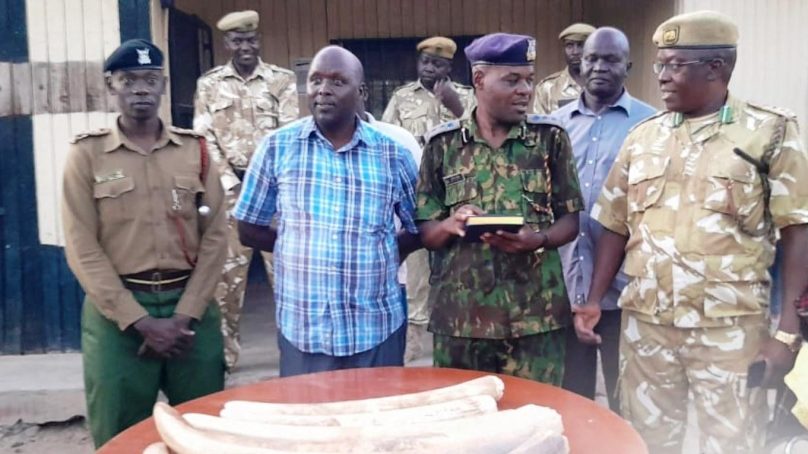
The arrest of two traffickers with five elephant tusks in the far-flung Lodwar town in Turkana County has refocused the searchlight on life in the wilds as recent trends suggest a resurgence in poaching unseen since Kenya Wildlife Service (KWS) declared in 2021 dramatically reduction in poaching incidence by 90 per cent.
Instructively, the seizure of the ivory that was being ferried from Kalokol to Lodwar happened two weeks after a similar incident in Meru, central Kenya, where police and KWS rangers arrested two suspected poachers with seven pieces of elephant tusks weighing approximately 14 kilogrammes and valued at Ksh1.5 million ($11,583).
The arrest of the traffickers in Meru happened hours after another gang was nabbed with 48 kilogrammes of elephant tusks in Kiritiri village in neighbouring Embu County.
The suspects in the Lodwar incident had six pieces of elephant tusks of unspecified market value. The incident suggests, conservationists fear, poachers are back in wilds and are decimating the elephants and rhinos with ferocity in under-policed game reserves in the north.
Kenya’s attention has mainly focused on national parks in the south, which covers Kwale, Taita Taveta and Tana River in southeast; Narok, Kajiado and Nakuru in central Rift Valley and the vast Mt Kenya ecological system.
According to KWS data, after the astronomical 2012 figures of elephant deaths, the Kenyan government introduced stiffer penalties for convicted poachers that include Ksh26 million ($200,000) fines and long prison sentences. To further eliminate the menace, Kenya has installed high-tech surveillance equipment, including drones, to track poachers and keep tabs on elephants and rhinos populations.
The KWS rangers in Turkana said they suspect the tusks were obtained by poachers who killed at least three elephants. The suspects will be charged with being in possession of wildlife trophies of endangered species contrary to section 92(4) of the Wildlife Conservation Management Act 2013.
Elephant tusks fetch a fortune in black markets in China, Middle East, Asia and Far East, where demand remains high despite the international ban on trade in endangered species, especially ivory from Africa.
According the United Nations’ Convention on International Trade in Endangered Species (CITES), illegal trade in ivory and rhino horns is fuelled by super-high demand in Asia and the Middle East, where elephant tusks and rhino horns are used to make ornaments and traditional medicines.
CITES data show that, despite the ban on the international ivory trade, African elephant population are on rapid decline in elephant range states in eastern, southern, central and West Africa. CITES estimates that, at least 20,000 elephants are killed annually in Africa for their ivory.
KWS and stakeholders have put in place mechanisms to eradicate all forms of wildlife crime, particularly poaching. These mechanisms include enhanced community education, interagency collaboration, and intensive intelligence-led operations, among others.
The results of effective community education played a part in the arrest of the traffickers it is members of the public who alerted the KWS officers of the crime. In turn KWS rangers alerted national police, leading to the arrest of the two suspects at Monti about 45 kilometres from Lodwar town, Ombui explained. KWS’s Chege said the service is committed to wildlife protection and conservation efforts.
“This arrest underscores our commitment in protecting wildlife. We urge members of the public to continue volunteering such information so we can protect our wildlife,” he said.
In Lodwar, Turkana Central Sub-County Police Commander Evans Ombui said the two suspects were arrested following a tip off from the members of the public. The six tasks weighed 26.4 kilogrammes, according to Kenya Wildlife Service (KWS) officer in charge of Turkana County Elijah Chege.
Turkana Central Deputy County Commissioner Thomas Siele warned against poaching and trade in the wildlife trophies. He vowed that the suspects will be arraigned in Lodwar law court on Monday.
- A Tell Media / KNA report / By Peter Gitonga







